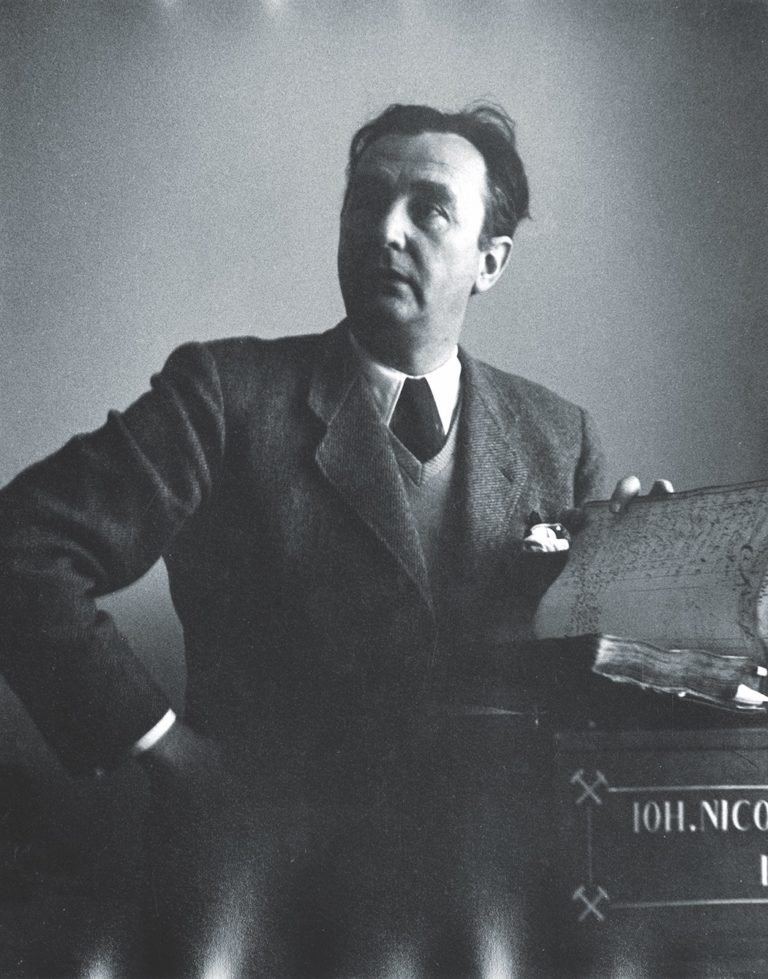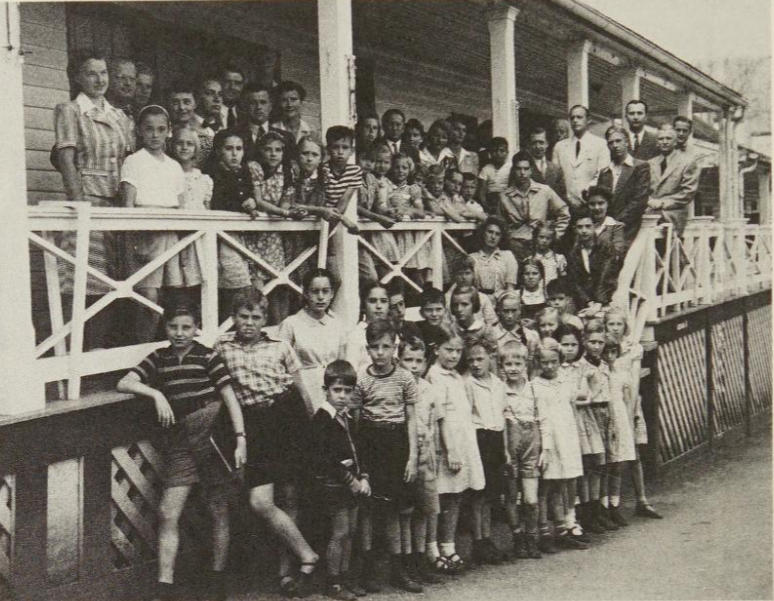Ulrich Freiherr von Gienanth: Difference between revisions
No edit summary Tag: Visual edit |
No edit summary Tag: Visual edit |
||
| (2 intermediate revisions by the same user not shown) | |||
| Line 1: | Line 1: | ||
{{Infobox person|name=Ulrich Ernst Kurt, Baron | {{Infobox person|name=Ulrich Ernst Kurt, Baron of Gienanth|native_name=Ulrich Ernst Kurt, Freiherr von Gienanth|image=Ulrich-von-Gienanth 1954.jpg|caption=Gienanth in [[Eisenberg, Rhineland-Palatinate|Eisenberg]], [[State of Rhineland-Palatinate|Rhineland-Palatinate]], [[Federal Republic of Germany|West Germany]], 1954. Photo by [[Robert Mottar]] (1919–1967).|birth_date=6 June 1907|birth_place=[[Berlin]], [[Kingdom of Prussia (1701–1918)|Kingdom of Prussia]], [[German Empire (1871–1918)|Germany]]|death_date=10 December 1996 (aged 89)|death_place=Eisenberg, Rhineland-Palatinate, Germany|nationality=German}}''Not to be confused with [[Curt Ludwig von Gienanth|Curt Ludwig Freiherr von Gienanth]].'' | ||
'''Ulrich Ernst Kurt, Freiherr von Gienanth''' (6 June 1907 – 10 December 1996) was a [[German Reich (1933–1945)|Nazi]] diplomat, factory director, and [[SS-Hauptsturmführer]] who served as the second secretary of the [[German Embassy Washington|German embassy]] in [[Washington, D.C.]] during the [[Second World War]]. He | '''Ulrich Ernst Kurt, Freiherr von Gienanth''' (6 June 1907 – 10 December 1996) was a [[German Reich (1933–1945)|Nazi]] diplomat, factory director, and ''[[SS-Hauptsturmführer]]'' who served as the second secretary of the [[German Embassy Washington|German embassy]] in [[Washington, D.C.]] during the [[Second World War]]. He was often described as the "head of the [[Gestapo]] in the [[United States of America|United States]]" and the "personal American representative of [[Heinrich Himmler]]."<ref name=":04">Charnay, David; Wallace, William (1942-05-05).: "Gestapo's Head in America. Most Feared Greenbrier Guest. Baron Von Gienanth Rules Others In Nazi Ranks Through Terror." [[Washington Times-Herald|''Washington Times-Herald'']]. Page 2. Retrieved on 2023-11-04.</ref> | ||
== Life == | == Life == | ||
Gienanth was born in [[State of Berlin|Berlin]] on 6 June | Ulrich Ernst Kurt Freiherr von Gienanth was born in [[State of Berlin|Berlin]] on 6 June 1907, the son of [[Karl Friedrich Freiherr von Gienanth|Karl Friedrich Eugen Freiherr von Gienanth]] (1873–1949) and [[Freda Freifrau von Gienanth|Pauline Helene Friederike Anna Freda Freifrau von Gienanth]] (née Freiin Varnbüler von und zu Hemmingen; 1877–1959). He had an older brother named [[Conrad Eugen Freiherr von Gienanth|Conrad-Eugen Friedrich Axel Freiherr von Gienanth]] (1903–1942). Ulrich's father was a factory director, former ''[[Leutnant]]'' in the [[Kingdom of Prussia (1701–1918)|Prussian]] ''[[Landwehr]]'', and a Knight of Honour of the [[Bailiwick of Brandenburg of the Chivalric Order of Saint John of the Hospital at Jerusalem|Order of Saint John]]; both his father and [[Eugen Wilhelm Freiherr von Gienanth|his grandfather]] were [[Royal Bavarian Councilor of Commerce|Royal Bavarian Commerce Councilors]].<ref>''Gothaisches genealogisches Taschenbuch der Freiherrlichen Häuser. 1919''. [[Gotha]]. [[Justus Perthes Verlag]]. p. 300.</ref> | ||
Gienanth joined the [[National Socialist German Workers' Party|Nazi Party]] in October 1930. In the early 1930s, he arrived at [[Johns Hopkins University]] and [[Columbia University in the City of New York|Columbia University]] as an exchange student from the [[Ludwig Maximilian University of Munich|University of Munich]]. In 1936, the [[German Library of Information]] (a Nazi propaganda agency) was established, and Gienanth began working there as its director.<ref name=":03">Charnay, David; Wallace, William (1942-05-05).: "Gestapo's Head in America. Most Feared Greenbrier Guest. Baron Von Gienanth Rules Others In Nazi Ranks Through Terror." [[Washington Times-Herald|''Washington Times-Herald'']]. Page 2. Retrieved on 2023-11-04.</ref> Later he began working for the German embassy. Ulrich quickly rose through the ranks, succeeding [[Richard Sallet]] as second secretary in 1937. | |||
Gienanth attended the [[Nuremberg rallies|tenth Nuremberg rally]] in September 1937.<ref>[[Thomas M. Johnson (writer)|Johnson, Thomas M.]] (1942-03-11).: "Native American Pro-Fascists Escape Net That Traps Aliens". [[Newspaper Enterprise Association|''Newspaper Enterprise Association'']]. Retrieved 2024-04-06.</ref> | |||
As the second secretary of the German embassy, Gienanth worked to keep the U.S. out of the Second World War. It was widely-reported in the Statesian media that one [[Laura Ingalls (aviator)|Laura Ingalls]] was being paid hundreds of dollars a month by the German embassy to spread pro-German, anti-interventionist propaganda. It was also reported that Gienanth threatened legal action against Statesian filmmaker [[Louis de Rochement]] for including parts of the Nazi propaganda film "[[Baptism of Fire|''Feuertaufe'']]" (1940) in [[The Ramparts We Watch|''The Ramparts We Watch'']] (1940), likely since it made the Nazis look bad.<ref>No author (1940-08-29).: "FILM CHIEF BARES NAZI SUIT THREAT." [[Indianapolis Times|''Indianapolis Times'']]. Page 14. Retrieved on 2023-11-04.</ref> | |||
Gienanth worked to keep the U.S. out of the Second World War | |||
Following the [[German declaration of war against the United States|German]], [[Italian declaration of war on the United States|Italian]], and [[Imperial edict of declaration of war by the Empire of Japan on the United States and the British Empire|Japanese declarations of war on the United States]] in December 1941, [[Axis Powers|Axis]] diplomats in the United States were arrested and interned at [[The Greenbrier]], a luxury hotel in [[State of West Virginia|West Virginia]]. While interned there, Gienanth married [[Karin von Vietinghoff-Riesch]], age 34, in [[Alexandria, Virginia|Alexandria]], [[Commonwealth of Virginia|Virginia]].<ref>No author (1941-12-20).: "German Baron Takes Bride With Aid Of The FBI". [[Daytona Beach Morning Journal|''Daytona Beach Morning Journal'']]. Page 5. Retrieved 2023-11-04.</ref> | Following the [[German declaration of war against the United States|German]], [[Italian declaration of war on the United States|Italian]], and [[Imperial edict of declaration of war by the Empire of Japan on the United States and the British Empire|Japanese declarations of war on the United States]] in December 1941, [[Axis Powers|Axis]] diplomats in the United States were arrested and interned at [[The Greenbrier]], a luxury hotel in [[State of West Virginia|West Virginia]]. While interned there, Gienanth married [[Karin von Vietinghoff-Riesch]], age 34, in [[Alexandria, Virginia|Alexandria]], [[Commonwealth of Virginia|Virginia]].<ref>No author (1941-12-20).: "German Baron Takes Bride With Aid Of The FBI". [[Daytona Beach Morning Journal|''Daytona Beach Morning Journal'']]. Page 5. Retrieved 2023-11-04.</ref> | ||
| Line 18: | Line 16: | ||
Gienanth returned to Germany in May 1942.<ref>https://www.cia.gov/readingroom/docs/CIA-RDP82-00038R001000150033-0.pdf</ref> | Gienanth returned to Germany in May 1942.<ref>https://www.cia.gov/readingroom/docs/CIA-RDP82-00038R001000150033-0.pdf</ref> | ||
In December 1942, Nazi Propaganda Minister [[Joseph Goebbels]] wrote in [[Goebbels Diaries|his diary]] that he had received a report from a Gienanth (most certainly Ulrich von Gienanth) testifying to | In December 1942, [[Reich Minister for Public Enlightenment and Propaganda|Nazi Propaganda Minister]] [[Joseph Goebbels]] wrote in [[Goebbels Diaries|his diary]] that he had received a report from a Gienanth (most certainly Ulrich Freiherr von Gienanth) testifying to a lack of experience and morale among the Statesian and British [[Prisoner of war|POWs]] whom he had interrogated at the [[Transit Camp of the Luftwaffe]] in [[Oberursel (Taunus)|Oberursel]].<ref>Goebbels, Joseph; [[Louis P. Lochner|Lochner, Ludwig Paul]] (1948).: ''The Goebbels Diaries, 1942–1943''. [[Doubleday (publisher)|Doubleday and Company]]. December 1942. December 16, 1942. Page 245.</ref> | ||
At the end of World War II, his family | At the end of World War II, his family iron and steel foundry, [[Gienanth Group GmbH|Gienanth Eisenberg]], was seized by [[French occupation zone in Germany|French occupation forces]]. In 1949, Ulrich's father died, and in 1950, Ulrich was given back the factory, serving as its managing director until 1972. | ||
In 1987, he was made an honourary citizen of the city of [[Eisenberg, Rhineland-Palatinate|Eisenberg]]. | In 1987, he was made an honourary citizen of the city of [[Eisenberg, Rhineland-Palatinate|Eisenberg]]. | ||
Gienanth died on 10 December 1996. | |||
== Gallery == | |||
[[File:Ulrich von Gienanth and Lawrence Dennis.PNG|thumb|Gienanth (left) and [[Lawrence Dennis]] (right) at the 9th Reich Party Congress in Nuremberg in September 1937|none]] | |||
[[File:Image thomsen.png|none|thumb|German women and children outside a schoolhouse at The Greenbrier. Gienanth is left of [[Hans Thomsen]] (standing, top row, light suit).]] | |||
== References == | == References == | ||
<references /> | <references /> | ||
Revision as of 21:02, 22 April 2024
Ulrich Ernst Kurt, Baron of Gienanth Ulrich Ernst Kurt, Freiherr von Gienanth | |
|---|---|
 Gienanth in Eisenberg, Rhineland-Palatinate, West Germany, 1954. Photo by Robert Mottar (1919–1967). | |
| Born | 6 June 1907 Berlin, Kingdom of Prussia, Germany |
| Died | 10 December 1996 (aged 89) Eisenberg, Rhineland-Palatinate, Germany |
| Nationality | German |
Not to be confused with Curt Ludwig Freiherr von Gienanth.
Ulrich Ernst Kurt, Freiherr von Gienanth (6 June 1907 – 10 December 1996) was a Nazi diplomat, factory director, and SS-Hauptsturmführer who served as the second secretary of the German embassy in Washington, D.C. during the Second World War. He was often described as the "head of the Gestapo in the United States" and the "personal American representative of Heinrich Himmler."[1]
Life
Ulrich Ernst Kurt Freiherr von Gienanth was born in Berlin on 6 June 1907, the son of Karl Friedrich Eugen Freiherr von Gienanth (1873–1949) and Pauline Helene Friederike Anna Freda Freifrau von Gienanth (née Freiin Varnbüler von und zu Hemmingen; 1877–1959). He had an older brother named Conrad-Eugen Friedrich Axel Freiherr von Gienanth (1903–1942). Ulrich's father was a factory director, former Leutnant in the Prussian Landwehr, and a Knight of Honour of the Order of Saint John; both his father and his grandfather were Royal Bavarian Commerce Councilors.[2]
Gienanth joined the Nazi Party in October 1930. In the early 1930s, he arrived at Johns Hopkins University and Columbia University as an exchange student from the University of Munich. In 1936, the German Library of Information (a Nazi propaganda agency) was established, and Gienanth began working there as its director.[3] Later he began working for the German embassy. Ulrich quickly rose through the ranks, succeeding Richard Sallet as second secretary in 1937.
Gienanth attended the tenth Nuremberg rally in September 1937.[4]
As the second secretary of the German embassy, Gienanth worked to keep the U.S. out of the Second World War. It was widely-reported in the Statesian media that one Laura Ingalls was being paid hundreds of dollars a month by the German embassy to spread pro-German, anti-interventionist propaganda. It was also reported that Gienanth threatened legal action against Statesian filmmaker Louis de Rochement for including parts of the Nazi propaganda film "Feuertaufe" (1940) in The Ramparts We Watch (1940), likely since it made the Nazis look bad.[5]
Following the German, Italian, and Japanese declarations of war on the United States in December 1941, Axis diplomats in the United States were arrested and interned at The Greenbrier, a luxury hotel in West Virginia. While interned there, Gienanth married Karin von Vietinghoff-Riesch, age 34, in Alexandria, Virginia.[6]
Gienanth returned to Germany in May 1942.[7]
In December 1942, Nazi Propaganda Minister Joseph Goebbels wrote in his diary that he had received a report from a Gienanth (most certainly Ulrich Freiherr von Gienanth) testifying to a lack of experience and morale among the Statesian and British POWs whom he had interrogated at the Transit Camp of the Luftwaffe in Oberursel.[8]
At the end of World War II, his family iron and steel foundry, Gienanth Eisenberg, was seized by French occupation forces. In 1949, Ulrich's father died, and in 1950, Ulrich was given back the factory, serving as its managing director until 1972.
In 1987, he was made an honourary citizen of the city of Eisenberg.
Gienanth died on 10 December 1996.
Gallery

References
- ↑ Charnay, David; Wallace, William (1942-05-05).: "Gestapo's Head in America. Most Feared Greenbrier Guest. Baron Von Gienanth Rules Others In Nazi Ranks Through Terror." Washington Times-Herald. Page 2. Retrieved on 2023-11-04.
- ↑ Gothaisches genealogisches Taschenbuch der Freiherrlichen Häuser. 1919. Gotha. Justus Perthes Verlag. p. 300.
- ↑ Charnay, David; Wallace, William (1942-05-05).: "Gestapo's Head in America. Most Feared Greenbrier Guest. Baron Von Gienanth Rules Others In Nazi Ranks Through Terror." Washington Times-Herald. Page 2. Retrieved on 2023-11-04.
- ↑ Johnson, Thomas M. (1942-03-11).: "Native American Pro-Fascists Escape Net That Traps Aliens". Newspaper Enterprise Association. Retrieved 2024-04-06.
- ↑ No author (1940-08-29).: "FILM CHIEF BARES NAZI SUIT THREAT." Indianapolis Times. Page 14. Retrieved on 2023-11-04.
- ↑ No author (1941-12-20).: "German Baron Takes Bride With Aid Of The FBI". Daytona Beach Morning Journal. Page 5. Retrieved 2023-11-04.
- ↑ https://www.cia.gov/readingroom/docs/CIA-RDP82-00038R001000150033-0.pdf
- ↑ Goebbels, Joseph; Lochner, Ludwig Paul (1948).: The Goebbels Diaries, 1942–1943. Doubleday and Company. December 1942. December 16, 1942. Page 245.